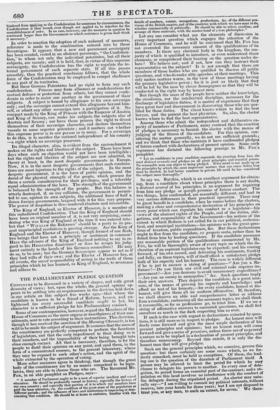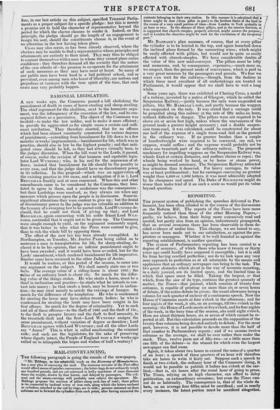THE PARLIAMENTARY PLEDGE QUESTION CONTINUES to be discussed in a
variety of shapes, and with great diversity of views; but, upon the whole, the general opinion ap- pears to be settling into an acquiescence in the doctrine laid down -in our article on this subject five weeks ago,—that where the candidate is known to be a friend of Reform, honest, and en- lightened (as every successful candidate ought to be), his character is a sufficient pledge for his Parliamentary conduct. Some of our contemporaries, however, regard the Members Of the House of Commons as the mere organs or mouthpieces of their con- stituents, sent to vote according to their instructions. This doctrine, though it has received the sanction of the Morning Chronicle, is too wild to be made the subject of' argument. It assumes that the mass of the constituency are perfectly competent to perform the functions of legislators, and that the only impediment to their doing so is their numbers, and the impossibility of their being brought into close enough contact. All that is necessary, therefore, is for the people to distil their opinions on any point, and send them, in the form of a concentrated essence, to the general laboratory,- where they may be exposed to each other's action, and the spirit of the whole extracted by the operation of voting. More sober reasoners agree in thinking, that though the great body of the constituency are by no means competent to be legis- lators, they, are able to choose those who are. The Reverend Mr. Fox, in an able pamphlet on Pledges, says- " A member of Parliament ought to be a man of superior intellect and sound education. He should be profoundly versed in history, especially the history of our own country; and especially that portion of it to which our annalists have paid the least attention, riz, the condition of the great Mass of the population at different periods; and the influence of laws and institutions in improving or dete- riorating that condition. He should be at home in statistics, familiar with the hindered from applying to the Confederation for assistance by circumstances, the details of numbers, extent, occupations, productions, 8ce, of the different pro.. Confederation is then bound, even though net applied to, to interfere for the , vinces of the British empire, and of the countries with which we have most to do, reestablishment of order. In no case, however, can the measures in question be ' whether commercially or politically. He should be able to select, combine, and continued longer than the Government to which assistance is given shall think arrange all these materials, with the master-hand of a true philosopher." Let any one consider what are the elements of discussion in every important question which engages the attention of the House of Commons, and he will be convinced that Mr. Fox has not overrated the necessary amount of the qualifications of its members. Is there any electoral body in the kingdom, the ma- jority of which is qualified to introduce, or even understand those elements, or comprehend their bearing on the question under de- bate ? We believe not; and if not, how can they instruct their representative on the subject ? It is not enough that there are members of those bodies who are qualified to discuss all public questions, and who do make able speeches at their meetings. This only makes matters worse, in the view of those meetings having the primary legislative power ; for it is just as likely that they will be led by the nose by clever demagogues as that they will be conducted in the right way by honest men. But though the mass of the people have neither the knowledge, the steadiness, nor the intellectual discipline, necessary for the discharge of legislative duties, it is matter of experience that they have great tact and discernment in discovering those who are qua- lified for those duties. The client knows where to find the best lawyer, and the patient the best physician. So, also, the elector knows where to find the best representative.
Among those who admit the independent and deliberative ca- pacity of members of Parliament, many contend that the exaction of pledges is necessary to furnish the elector with the means of judging of the fitness of the candidate. For this opinion, con- sidering the matter generally, we do not see sufficient grounds ; and we think that those who maintain it have confounded pledges of future conduct with declarations of present opinion. Some such vagueness has dictated the following passage in Mr. Fox's pamphlet.
" Let no confidence in your candidate supersede the exacting from him the most distinct avowals and pledges on all great principles and essential points. No reasonable man can object to being pledged. If his mind is not made up on the principles by which the most important matters that can come before him must be decided, he had better continue in private life until he has considered the subject more thoroughly."
So say we. But this, which is an excellent argument for obtain- ing, from a candidate about whose principles there is any doubt. a distinct avowal of his principles, is no argument for requiring from him any pledge or specific promise of future conduct. The two things, here confounded, are essentially different, and lead to very serious differences in their practical operation. There may be great benefit in a candidate, when he comes before the electors, making a clear and comprehensive declaration of his principles on every point which can regulate his conduct as a legislator—his views of the abstract rights of the People, and of the duties, obli- gations, and responsibility of the Government—his notions of the extent to which Reform is yet called for in our political, ecclesias- tical, and municipal institutions—his opinions as to the (Treat ques- tions of taxation, public expenditure, &c. But these declarations ought to flow from the candidate, ex proprio motu, rather than be fished from him by leading questions. If the candidate possesses any reasonable portion of the qualifications enumerated by Mr. Fox, he will be thoroughly aware of every topic on which the de- claration of an aspirant legislator can be expected; and his coming forward, of his own accord, and delivering his sentiments, frankly and fully, on these topics, will of itself afford a satisfactory pledge both of his capacity and his honesty. The case is widely different if he is put to answer a string of questions—" Are you a Re- former ?—Do you think our civil and criminal code requires MI- provement?—Are you desirous to avoid unnecessary expenditure? —Are you an enemy to monopolies?" &c. Such questions imply their own answers. They deprive the candidate, in a great mea- sure, of the means of proving his capacity and knowledge; and afford no test of his honesty,—for every candidate, honest or dis- honest, will give them all an uniform affirmative. If, therefore; we shall observe an able and comprehensive letter or address from a candidate, embracing all the necessary topics, we shall think it reasonable, so far as professions go, to trust him. If we see a string of affirmative answers to concerted questions, we shall feel ourselves as much in the dark respecting him as ever.
If such is the case with regard to declarations extorted by ques- tions, it is still more so in respect to pledges. An honest man will freely come forward and give the most ample declaration of his present principles and opinions; but no honest man will come forward and give a series of promises, unless these are of so general a nature as to be implied in a declaration of present principles, and therefore unnecessary. Beyond this extent, it is only the honest man that will give pledges. Such are the general principles which, we conceive, govern this question: but there certainly are some cases which, as we for- merly remarked, must be held as exceptions. Of these, the lead- ing one is the question of the duration of Parliament itself. A person may be allowed to limit the period for which he may choose to delegate his powers to another. In every case of dele- gation, its period forms an essential part of the contract; and a sti- pulation on this head involves no interference with the conduct of the delegate during the stipulated period. An elector may natu- rally say—" I am willing to commit my political interests, without reserve, into your hands for three years; but I am not disposed to trust you, or any man, to such an extent, for seven: We there- fore, in our last article on this subject, specified Triennial Parlia- ments as a proper subject for a specific pledge: but this is merely a promise not to hold the character of representative beyond the period for which the elector chooses to confer it. Indeed, on this principle, the pledge should go the length of an engagement to resign his seat, should the constituents choose it, in the event of no alteration in the law having taken place. Cases may also occur, as has been already observed, where the electors may be unable to find a representative whose principles and attainments are entirely to their mind. They may thus be obliged to content themselves with a man in whom they cannot place entire confidence : they therefore demand all the security that the nature of the case admits of—his promise to co-operate for the attainment of such measures as they may have most at heart. So many of our public men have been bred in a bad political school, and so prevalent, even among men who boast of liberality, are notions and prejudices at variance with the true spirit of the time, that such cases may very probably happen. .




























 Previous page
Previous page